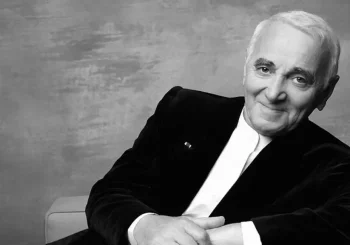For our fathers, grandfathers, uncles, aunts, and anyone who remembers life before the digital age, Oum Kalthoum and Abdel Halim weren’t just singers, they were the soundtrack to simpler times — a time when music meant turning a dial on the radio or reaching for the television remote, and a time when the music itself reflected the simpler sounds of the instruments of the past.
Their music mirrored precious moments, from waking up in the morning to the sounds of music to sipping tea on the balcony and watching the sunrise. It wasn’t background noise; it was the way they lived and interacted with the world around them.
Yet today’s youth are plugged into a whole new soundscape. From massive music festivals to streaming services like YouTube and Spotify, they experience music wholly differently. Speaking to the modern Egyptian youth through music requires understanding how they live, feel, and experience the world, and how music acts as the ever-present soundtrack to their lives.
Globalizing Arabic sounds
Recently, the global music scene has welcomed a diverse array of cultures and sounds, notably K-pop (Korean music), Afrobeats (African music), and Latin music.
An important milestone occurred in 2022 when the American Music Awards and the Grammy’s introduced the ‘Best Afrobeats’ category, recognizing excellence in African music for the first time.
However, Arabic music has yet to attain the same widespread global recognition. Although artists like Shakira, Cheb Khaled, and Rachid Taha have contributed to the globalization of specific Arabic sounds or dances, such as those associated with belly dancing or Rai instrumentals, the genre remains predominantly popular within the Arab region.
Social media, notably TikTok, has played a role in amplifying the popularity of Arabic sounds. Serving as a platform where music and sound serve as a universal language, TikTok has become instrumental in introducing diverse sounds to various cultures.
Today, it has become clear that music is now a digital form of cultural expression for many. It can be a meme or reflect various moods and emotions. In this context, Arabic music stands out. It naturally fits into this digital landscape due to its expressive and emotional qualities, creating a strong connection with digital culture.
In recent months, Arabic music has gained traction on the platform, with the emergence of the Shik Shak Shok trend captivating internet users.
Shik Shak Shok, a song that is about belly dancing, first debuted in the 1970s, and then later modernized in the 1990s, has recently experienced a resurgence as a viral trend. It reflects the cultural expressions of today’s online generation. Frequently used as a funny backdrop to express shock in videos, the song highlights the intersection of music with digital culture.
Several songs by Sherine Abdel Wahhab have gone viral, touching upon cultural themes such as toxic relationships or the rage felt by women post-heartbreak. Despite being solely in Arabic, the songs’ intense emotional qualities have deeply resonated with both the current Egyptian population and the wider Arab diaspora community.
Fusing different sounds
While certain Arabic songs gain popularity for their lyrics and cultural expression, others blend Western and Arabic musical elements, forging a fresh, global Arabic sound.
For Hisham Kharma, renowned Egyptian musician and producer, music is essentially about connecting generations; it speaks to the generations of today, of tomorrow and of the past. His distinctive sounds embody the authentic instrumentals of previous generations, yet they are imbued with the global rhythms and sounds of contemporary times.
“Artists can get stuck in their own egos, sticking to just one sound or style. But this prevents growth,” Kharma told Egyptian Streets. “While it’s important to stay true to your sound, it’s also necessary to understand how the new generation experiences music and the new rhythms and sounds influencing them.”
Born and raised in Cairo’s rich culture, Kharma’s music largely reflects his authentic Egyptian roots. But his travels to Miami, Hamburg, and Dubai have given him a global sound, and allowed him to listen to modern beats and instruments with an Egyptian ear.
Bringing a global twist to modern techno sound, all while staying true to his Egyptian roots, Kharma was able to invent a new global sound that’s both contemporary and distinctly Egyptian.
As you enter the Grand Egyptian Museum, you’ll likely hear Kharma’s music, especially ‘Kun‘, playing in the halls. It’s not your typical Western instrumental; instead, it carries a distinctly Egyptian essence, steering away from the stereotypical historical documentary soundtrack.
“It’s a balancing act to maintain authenticity in the music while ensuring its accessibility to a global audience,” Karma explains. “For my first album, I went through over four iterations, spending two years to refine it to its final form.”
His music features traditional instruments like the oud, a lute-like instrument, and the qanun, along with Egyptian drum rhythms. This unique blend creates a sonic journey through time, transporting listeners to a place where the beauty of old Egyptian music meets the energy of the digital age.
This unique approach has made his work a perfect fit for national events and television. Kharma’s compositions have served as soundtracks for major conferences and events like the Egyptian Youth Forum (2018), the Pharaohs’ Golden Parade, and most recently, COP27 (27th UN Climate Change Conference) held in Sharm El-Sheikh in 2022.
His talent extends to television as well, with themes for popular series like “El-Nehaya” (The End, 2019) and the Arabic adaptation of “Suits” (2021).
Despite being played for specific events, his work maintains a cohesive style, a unifying sound that resonates across audiences. Kharma lets his music flow from his heart rather than crafting it around specific ideas. His compositions are driven by pure emotion, inviting listeners to connect with the feeling itself.
“I used to focus on specific ideas in my albums. Now, I just want to evoke emotions and see how listeners interpret and connect with them,” he adds.
A new wave of Arab artists are fusing Western and Eastern influences, such as Palestinian singer Elyanna. Her recent performance on The Late Show with Stephen Colbert marked a historic moment – the first time a song was sung entirely in Arabic on the show’s 31-year run.
In her latest track, “Callin’ U (Tamally Maak)“, Elyanna puts a fresh spin on Amr Diab’s classic “Tamally Maak.” She blends the original Arabic vocals with modern, Western-influenced beats and instrumentation.
For Kharma, the process of sound fusion is very simple: it is about communication. Creating a global sound must be done with intentionality, not just by combining instruments. He believes a global Arabic sound needs to be a conversation, a shared language that can be understood across cultures.
“Imagine meeting someone from another culture. You might look different, but you can still connect through a shared language. That’s the kind of fusion I strive for in my music – a blend of sounds that transcends cultural barriers and allows everyone to find common ground,” he explains.







Comment (1)
[…] post The Rise of Globalized Arabic Music first appeared on Egyptian […]